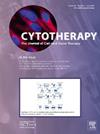The Future of Distributed Manufacturing: Rapid Production and Release of CAR-T on a Microfluidic Chip
IF 3.7
3区 医学
Q2 BIOTECHNOLOGY & APPLIED MICROBIOLOGY
引用次数: 0
Abstract
Background & Aim
Chimeric Antigen Receptor-T (CAR-T) cell therapy is a powerful new tool in the fight against cancer, with approved products for treatment of cancer and promising results in non-malignant diseases. While CAR-T has shown clinical utility, its complex manufacturing process results in high costs, with the price of a single dose greater than $350k. The manufacturing process relies on centralized production in specialized cGMP clean rooms using highly trained personnel. Significant overhead and logistics are required to handle multiple patient samples at once and ensure transportation of patient material between treatment and manufacturing sites.
We have developed a microfluidic chip-based approach that can integrate all critical process elements of CAR-T manufacturing (cell isolation, washing, culture, characterization and release testing) into a closed system. Critical design features allow cost-effective optimization and validation of new protocols from research scale to clinical production. We demonstrate the utility of this approach by making an antiCD19 CAR-T product.
Methodology
A microfluidic device was created with 310k microwells with 30 μm diameter and 100 μm depth. AntiCD19 CAR-T cells were produced by capturing CD3 cells into microwells from PBMCs using positive immunomagnetic isolation. Cells were labeled with CD3 and CD45 surface markers to characterize purity and total cell loading. Following characterization, perfusion culture was performed with T cell culture media and an anti-CD19 lentiviral vector (LVV) that also transduces GFP for 18 hours. After culture, the chip was imaged to characterize percentage of transduced cells by GFP expression. Export was performed by inverting the chip to sediment cells from wells and flushing to a collection vial. The entire process takes less than 24 hours.
Results
In three experiments, an average of 3.7e6 cells were loaded with 99.8% CD3 purity. After 18 hours of culture with LVV, 57% of cells were CAR+ as measured by GFP expression. Images of the chip before and after export indicate 2.61e6 cells were exported with post collection viability averaging 90%.
Conclusion
We have demonstrated an integrated, closed CAR-T manufacturing process capable of producing millions of cells in less than 24 hours. Our approach is scalable to produce larger doses has the potential to significantly reduce costs in a format that is easy to scale from concept to clinic.
分布式制造的未来:微流控芯片上CAR-T的快速生产和释放
背景,嵌合抗原受体t (CAR-T)细胞疗法是对抗癌症的一种强大的新工具,已批准的产品用于治疗癌症,在非恶性疾病中也有很好的效果。虽然CAR-T已经显示出临床用途,但其复杂的制造过程导致成本高昂,单剂价格超过35万美元。生产过程依赖于在专门的cGMP洁净室集中生产,使用训练有素的人员。要同时处理多个患者样本,并确保患者材料在治疗点和生产点之间的运输,需要大量的管理费用和物流。我们开发了一种基于微流控芯片的方法,可以将CAR-T制造的所有关键工艺元素(细胞分离,洗涤,培养,表征和释放测试)集成到一个封闭的系统中。关键的设计特点允许从研究规模到临床生产的新方案的成本效益优化和验证。我们通过制造一种antid19 CAR-T产品来证明这种方法的实用性。方法采用直径为30 μm、深度为100 μm的310k微孔制作微流控装置。采用阳性免疫磁隔离技术将CD3细胞从pbmc中捕获到微孔中,制备了antid19 CAR-T细胞。细胞用CD3和CD45表面标记物标记,以表征纯度和细胞总负载。鉴定后,用T细胞培养基和抗cd19慢病毒载体(LVV)进行灌注培养,LVV也能转导GFP,持续18小时。培养后,对芯片进行成像,通过GFP表达表征转导细胞的百分比。通过将芯片倒置到井中的沉淀物池中并冲洗到收集瓶中进行出口。整个过程不到24小时。结果3次实验中,平均3.7e6个细胞的CD3纯度为99.8%。LVV培养18小时后,57%的细胞呈CAR+,通过GFP表达测定。输出前后的芯片图像显示输出2.61e6个细胞,收集后存活率平均为90%。我们已经展示了一种集成的、封闭的CAR-T制造工艺,能够在不到24小时内生产数百万个细胞。我们的方法是可扩展的,可以生产更大的剂量,有可能以一种易于从概念扩展到临床的形式显着降低成本。
本文章由计算机程序翻译,如有差异,请以英文原文为准。
求助全文
约1分钟内获得全文
求助全文
来源期刊

Cytotherapy
医学-生物工程与应用微生物
CiteScore
6.30
自引率
4.40%
发文量
683
审稿时长
49 days
期刊介绍:
The journal brings readers the latest developments in the fast moving field of cellular therapy in man. This includes cell therapy for cancer, immune disorders, inherited diseases, tissue repair and regenerative medicine. The journal covers the science, translational development and treatment with variety of cell types including hematopoietic stem cells, immune cells (dendritic cells, NK, cells, T cells, antigen presenting cells) mesenchymal stromal cells, adipose cells, nerve, muscle, vascular and endothelial cells, and induced pluripotential stem cells. We also welcome manuscripts on subcellular derivatives such as exosomes. A specific focus is on translational research that brings cell therapy to the clinic. Cytotherapy publishes original papers, reviews, position papers editorials, commentaries and letters to the editor. We welcome "Protocols in Cytotherapy" bringing standard operating procedure for production specific cell types for clinical use within the reach of the readership.
 求助内容:
求助内容: 应助结果提醒方式:
应助结果提醒方式:


